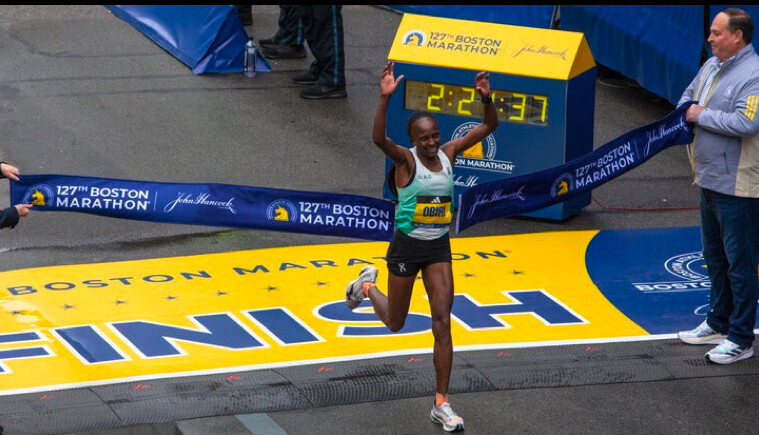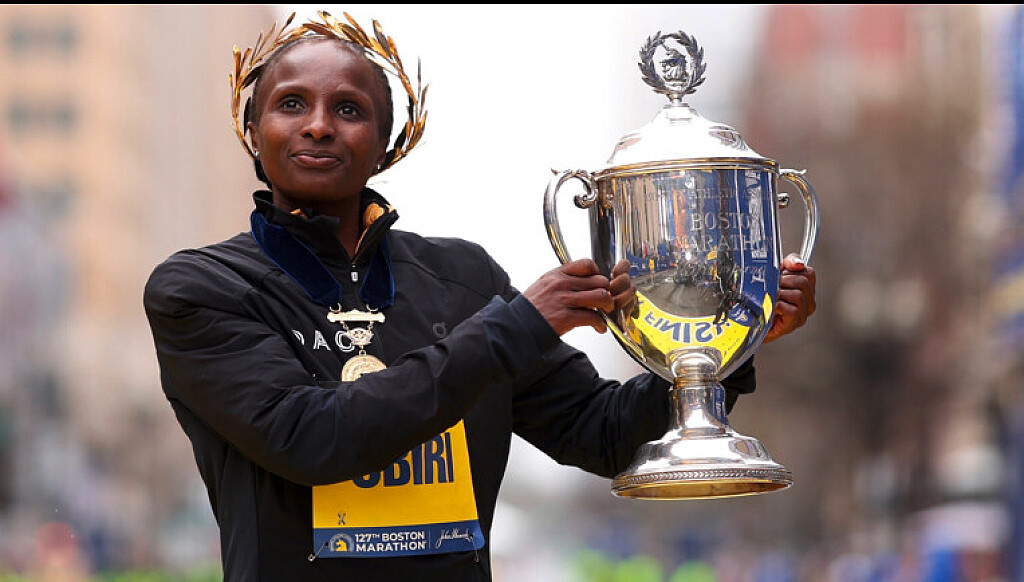Running News Daily
Running News Daily is edited by Bob Anderson. Send your news items to bob@mybestruns.com Advertising opportunities available. Train the Kenyan Way at KATA Kenya and Portugal owned and operated by Bob Anderson. Be sure to catch our movie A Long Run the movie KATA Running Camps and KATA Potato Farms - 31 now open in Kenya! https://kata.ke/
Index to Daily Posts · Sign Up For Updates · Run The World Feed
24 Hours with One of the World’s Best Marathoners
As the 2023 Boston Marathon winner and Olympian Hellen Obiri puts final touches on her build for the NYC Marathon, she’s aiming to become the seventh woman ever to win two majors in one year
Four weeks out from competing in the 2023 New York City Marathon, one of the world’s most prestigious road races, an alarm clock gently buzzes, signaling the start of the day for 33-year-old Hellen Obiri.

Despite having rested for nearly nine hours, Obiri, a two-time world champion from Kenya, says the alarm is necessary, otherwise she can oversleep. This morning’s training session of 12 miles at an easy pace is the first of two workouts on her schedule for the day as she prepares for the New York City Marathon on November 5.
The race will be her third attempt in the distance since she graduated from a successful track career and transitioned into road racing in 2022. Obiri placed sixth at her marathon debut in New York last November, finishing in 2:25:49.
“I was not going there to win. I was there to participate and to learn,” she says, adding that the experience taught her to be patient with the distance. This time around in New York, she wants to claim the title.
Obiri drinks two glasses of water, but she hasn’t eaten anything by the time she steps outside of her two-bedroom apartment in the Gunbarrel neighborhood of Boulder, Colorado.
In September 2022, the three-time Olympian moved nearly 9,000 miles from her home in the Ngong Hills, on the outskirts of Nairobi, Kenya, to Colorado. She wanted to pursue her marathon ambitions under the guidance of coach and three-time Olympian Dathan Ritzenhein, who is the fourth-fastest U.S. marathoner in history. Ritzenhein retired from professional running in 2020 and now oversees the Boulder-based On Athletics Club (OAC), a group of elite professional distance runners supported by Swiss sportswear company On.
Obiri, who was previously sponsored by Nike for 12 years before she signed a deal with On in 2022, said that moving across the world wasn’t a difficult decision. “It’s a great opportunity. Since I came here, I’ve been improving so well in road races.”
In April, Obiri won the Boston Marathon. It was only her second effort in the distance, and the victory has continued to fuel her momentum for other major goals that include aiming for gold at the 2024 Paris Olympics and also running the six most competitive and prestigious marathons in the world, known as the World Marathon Majors.
Obiri says goodbye to her eight-year-old daughter Tania and gets into a car to drive six miles to Lefthand trailhead, where she runs on dirt five days a week. She will train on an empty stomach, which she prefers for runs that are less than 15 miles. Once, she ate two slices of bread 40 minutes before a 21-mile run and was bothered by side stitches throughout the workout. Now, she is exceptionally careful about her fueling habits.
Three runners stretch next to their cars as Obiri clicks a watch on her right wrist and begins to shuffle her feet. Her warmup is purposely slow. In this part of Colorado, at 5,400 feet, the 48-degree air feels frostier and deserving of gloves, but Obiri runs without her hands covered. She is dressed in a thin olive-colored jacket, long black tights, and a black pair of unreleased On shoes.
Obiri’s feet clap against a long dirt road flanked by farmland that is dotted with horses and a few donkeys. Her breath is hardly audible as she escalates her rhythm to an average pace of six minutes and 14 seconds per mile. This run adds to her weekly program of 124 miles—some days, she runs twice. The cadence this morning is hardly tough on her lungs as she runs with her mouth closed, eyes intently staring ahead at the cotton-candy pink sunrise.
“Beautiful,” Obiri says.
Her body navigates each turn as though on autopilot. Obiri runs alone on easy days like today, but for harder sessions, up to four pacers will join her.
“They help me to get the rhythm of speed,” Obiri says. For longer runs exceeding 15 miles, Ritzenhein will bike alongside Obiri to manage her hydration needs, handing her bottles of Maurten at three-mile increments.
After an hour, Obiri wipes minimal sweat glistening on her forehead. Her breathing is steady, and her face appears as fresh as when she began the run. She does not stretch before getting into the car to return home.
The remainder of the morning is routine: a shower followed by a breakfast of bread, Weetabix cereal biscuits, a banana, and Kenyan chai—a mix of milk, black tea, and sugar. She likes to drink up to four cups of chai throughout the day, making the concoction with tea leaves gifted from fellow Kenyan athletes she sees at races.
Then, she will nap, sometimes just for 30 minutes, and other times upwards of two hours. “The most important thing is sleeping,” Obiri says. “When I go to my second run [of the day], I feel my body is fresh to do the workout. If I don’t sleep, I feel a lot of fatigue from the morning run.”
Obiri prepares lunch. Normally she eats at noon, but today her schedule is busier than usual. She cooks rice, broccoli, beets, carrots, and cabbage mixed with peanuts. Sometimes she makes chapati, a type of Indian flatbread commonly eaten in Kenya, or else she eats beans with rice.
The diet is typical among elite Kenyan athletes, and she hasn’t changed her eating habits since moving to the U.S. Obiri discovered a grocery store in Denver that offers African products, so she stocks up on ingredients like ground corn flour, which she uses to make ugali, a dense porridge and staple dish in many East African countries. She is still working through 20 pounds of flour she bought in June.
Obiri receives an hour massage, part of her routine in the early afternoon, three times a week. Usually the session is at the hands of a local physiotherapist, but sometimes Austin-based physiotherapist Kiplimo Chemirmir will fly in for a few days. Chemirmir, a former elite runner from Kenya, practices what he refers to as “Kenthaichi massage,” an aggressive technique that involves stretching muscles in short intervals.
Ritzenhein modifies Obiri’s training schedule, omitting her afternoon six-mile run so she can rest for the remainder of the day and reset for a speed workout tomorrow morning. Last fall, he took over training Obiri, who was previously coached by her agent Ricky Simms, who represented Jamaican sprinter Usain Bolt, an eight-time gold medalist and world record holder, and British long distance runner Mo Farah, a four-time Olympic gold medalist.
Ritzenhein has programmed Obiri’s progression into the marathon with more volume and strength training. The meticulous preparation is essential to avoid the aftermath of her marathon debut in New York City last fall, when she was escorted off the course in a wheelchair after lacking a calculated fueling and hydration strategy. Obiri had averaged running 5:33-minute miles on a hilly route that is considered to be one of the most difficult of all the world marathon major races.
“It’s a real racing race. You have to make the right moves; you have to understand the course,” Ritzenhein says of the New York City Marathon. “We’ve changed some things in training to be a little more prepared. We’ve been going to Magnolia Road, which is a very famous place from running lore—high altitude, very hilly. We’ve been doing some long runs up there. In general, she’s got many more 35 and 40K [21 and 24 miles] runs than she had before New York last year.”
In New York, Obiri is aiming to keep pace alongside a decorated elite field that will include Olympic gold medalist Peres Jepchirchir, former women’s marathon world record holder Brigid Kosgei, and defending New York Marathon champion Sharon Lokedi, all of whom are from Kenya. In fact, Kenyan women have historically dominated at the New York City Marathon, winning nine titles since 2010 and 14 total to date, the most of any country since women were permitted to race in 1972.
“They are all friendly ladies,” Obiri says. “But you know, in sports we are enemies. It’s like a war. Everybody wants to win.”
While Obiri is finishing her massage, her daughter returns from school. Though Obiri arrived in Colorado last fall, her husband Tom Nyaundi and their daughter didn’t officially move to the U.S. until this past March. The adjustment, Obiri says, was a hard moment for the family.
“We didn’t have a car. In the U.S. you can’t move [around] if you don’t have a car. We had a very good team that helped us a lot,” Obiri says of the OAC, whom she refers to as her friends. “The athletes made everything easier for us. They were dropping my daughter to school. Coach would pick me up in the morning, take me to massage, to the store. I was lucky they were very supportive.” Now, Obiri says she and her family have fully adjusted to living in the U.S.
Obiri returns home and makes a tomato and egg sandwich before taking another nap. Usually she naps for up to two hours after lunch. Today, her nap is later and will last for two and a half hours.
Obiri doesn’t eat out or order takeaway. “We are not used to American food,” she says, smiling. “I enjoy making food at home.” Dinner is a rotation of Kenyan dishes like sukuma wiki—sautéed collard greens that accompany ugali—or pilau, a rice-based dish made with chicken, goat, or beef. This evening, she prepares ugali with sukuma wiki and fried eggs.
Before bed, Obiri says she can’t resist a nightcap of Kenyan chai. She will pray before falling asleep. And when she wakes up at 6:00 A.M. the next day, she will prepare for a track session, the intervals of which add up to nearly 13 miles: a 5K warmup, followed by 1 set of 4×200 meters at 32 seconds (200 meter jog between each rep); 3 sets of 4×200 meters at 33 seconds (200 meter jog between each rep); 5×1600 meters at 5:12 (200 meter jog between each rep) and finishing with a 5K cool down.
The workout is another one in the books that will bring her a step closer to the starting line of the race she envisions winning. “I feel like I’m so strong,” Obiri says. She knows New York will be tough. But “when I go to a race I say, ‘you have to fight.’ And if you try and give your best, you will do something good.”
Login to leave a comment




